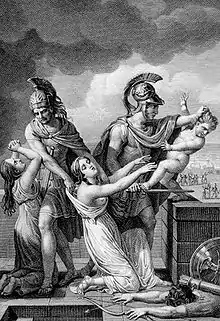Astyanax
See also: astyanax
Translingual

Astyanax mexicanus
Etymology
From Ancient Greek Ἀστυάναξ (Astuánax), nickname of the firstborn son of Hector. Some species epithets also refer to the Trojan War.
Proper noun
Astyanax m
- A taxonomic genus within the family Characidae – numerous fish, including some of the tetras.
Hypernyms
- (genus): Eukaryota – superkingdom; Animalia – kingdom; Bilateria – subkingdom; Deuterostomia – infrakingdom; Chordata – phylum; Vertebrata – subphylum; Gnathostomata – infraphylum; Actinopterygii – superclass; Teleostei – class, Ostariophysi - superorder; Characidae - family
Hyponyms
- (genus): Astyanax mexicanus (Mexican tetra) - type species; Astyanax abramis, Astyanax aeneus, Astyanax alburnus, Astyanax altior, Astyanax altiparanae, Astyanax angustifrons, Astyanax anterior, Astyanax aramburui, Astyanax argyrimarginatus, Astyanax armandoi, Astyanax asuncionensis, Astyanax atratoensis, Astyanax bimaculatus, Astyanax biotae, Astyanax bockmanni, Astyanax bourgeti, Astyanax brachypterygium, Astyanax brevirhinus, Astyanax caucanus, Astyanax chaparae, Astyanax chico, Astyanax clavitaeniatus, Astyanax cordovae, Astyanax correntinus, Astyanax cremnobates, Astyanax daguae, Astyanax dnophos, Astyanax eigenmanniorum, Astyanax elachylepis, Astyanax endy, Astyanax epiagos, Astyanax fasciatus, Astyanax fasslii, Astyanax festae, Astyanax filiferus, Astyanax gisleni, Astyanax giton, Astyanax goyacensis, Astyanax gracilior, Astyanax guaporensis, Astyanax guaricana, Astyanax guianensis, Astyanax gymnogenys, Astyanax hastatus, Astyanax henseli, Astyanax hermosus, Astyanax integer, Astyanax intermedius, Astyanax ita, Astyanax jacobinae, Astyanax jacuhiensis, Astyanax janeiroensis, Astyanax jenynsii, Astyanax jordani, Astyanax kennedyi, Astyanax kompi, Astyanax kullanderi, Astyanax lacustris, Astyanax latens, Astyanax laticeps, Astyanax leonidas, Astyanax leopoldi, Astyanax lineatus, Astyanax longior, Astyanax maculisquamis, Astyanax magdalenae, Astyanax marionae, Astyanax maximus, Astyanax megaspilura, Astyanax microlepis, Astyanax multidens, Astyanax mutator, Astyanax myersi, Astyanax nasutus, Astyanax nicaraguensis, Astyanax obscurus, Astyanax ojiara, Astyanax orbignyanus, Astyanax orthodus, Astyanax pampa, Astyanax paraguayensis, Astyanax parahybae, Astyanax paranae, Astyanax paris, Astyanax pataroensis, Astyanax pedri, Astyanax pelegrini, Astyanax pinnata, Astyanax pirabitira, Astyanax pirapuan, Astyanax polylepis, Astyanax puka, Astyanax pynandi, Astyanax ribeirae, Astyanax riberrimus, Astyanax rivularis, Astyanax robustus, Astyanax rupununi, Astyanax saguazu, Astyanax saltor, Astyanax scabripinnis, Astyanax schubarti, Astyanax scintillans, Astyanax siapae, Astyanax stenohalinus, Astyanax stilbe, Astyanax superbus, Astyanax symmetricus, Astyanax taeniatus, Astyanax totae, Astyanax trierythropterus, Astyanax troya, Astyanax tupi, Astyanax turmalinensis, Astyanax unitaeniatus, Astyanax utiariti, Astyanax validus, Astyanax venezuelae, Astyanax varzeae, Astyanax villwocki, Astyanax xavante - other species
References
 Astyanax (fish) on Wikipedia.Wikipedia
Astyanax (fish) on Wikipedia.Wikipedia  Astyanax on Wikispecies.Wikispecies
Astyanax on Wikispecies.Wikispecies  Astyanax (genus) on Wikimedia Commons.Wikimedia Commons
Astyanax (genus) on Wikimedia Commons.Wikimedia Commons
English

Astyanax being thrown from the walls of Troy
Etymology
From Ancient Greek Ἀστυάναξ (Astuánax, “city lord”), the nickname for the firstborn son of Hector, protector of Troy.
Proper noun
Astyanax
- (Greek mythology) The nickname of Scamandrius, child son of Hector and Andromache.
- 1712, Ambrose Philips, The Distrest Mother, [adapted from 1667, Jean Racine, Andromaque], 1819, The Distrest Mother: A Tragedy, Act 1, Scene 1, page 3,
- The jealous chiefs, and all the states of Greece, / With one united voice complain of Pyrrhus; / That now, forgetful of the promise giv'n, / And mindless of his godlike father's fate, / Astyanax he nurses in his court; Astyanax, the young, surviving hope / Of ruin'd Troy; Astyanax descended / From a long race of kings—great Hector's son.
- 1983, Norman T. Pratt, Seneca's Drama, page 110:
- After lying that the boy is dead and defying the threat of torture, she[Andromache] is unable to conceal her anguish for the boy's life and gives in to the threat that Hector's tomb will be destroyed if Astyanax is dead, that is, to the threat that both the sanctity of the tomb and the life of the boy will be destroyed together.
- 1712, Ambrose Philips, The Distrest Mother, [adapted from 1667, Jean Racine, Andromaque], 1819, The Distrest Mother: A Tragedy, Act 1, Scene 1, page 3,
This article is issued from Wiktionary. The text is licensed under Creative Commons - Attribution - Sharealike. Additional terms may apply for the media files.